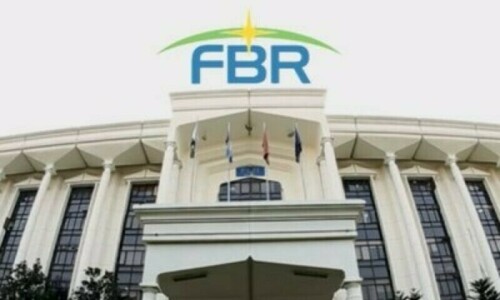ISLAMABAD: At the opening of an unplanned official visit of the International Monetary Fund (IMF), Pakistan authorities on Monday stuck to budgeted revenue targets and promised to overcome first quarter shortfalls through enforcement and administrative measures.
Informed sources told Dawn that the visiting fund staff, led by mission chief to Pakistan Nathan Porter, initiated discussions on revenue situation with Pakistani team, led by Minister of State for Revenue Ali Pervez Malik and Federal Board of Revenue chairman Rashid Mehmood Langrial.
The mission will stay here until Nov 15 “to discuss recent developments and programme performance to date”, according to informed sources. “This mission is not part of the first review under the extended fund facility (EFF), which will be no earlier than the first quarter of 2025,” they said.
Under the programme modalities, the IMF and Pakistan authorities are required to hold biannual review meetings. As such, first formal review has to take place on the basis of end-December 2024 performance for Pakistan to qualify for disbursement of second installment of over $1bn by March 15, 2025. The $7bn programme is divided into six biannual reviews for equal tranches of $1bn each.
IMF staff on unplanned official visit, not part of first review under EFF
The sources said Pakistani side updated the visiting mission on about Rs190bn revenue shortfall in first four months, almost half of which accrued in October alone. This had raised alarms in the lenders’ quarters that revenue shortfall was gradually increasing with declining rate of inflation.
An unplanned mission was thus rolled out to take stock of the situation, not only at the revenue front but also on the privatisation programme that met with a setback at the botched sale of Pakistan International Airlines, raising a question mark over the prequalification of bidders and privatisation strategy on a whole.
The sources said the FBR team assured the mission that its enforcement and administrative measures were just taking off and its efforts were gaining momentum to show initial results by end of current month and narrow down early revenue losses. The shortfall, they added, was within the 1pc quarterly rolling target. They said the FBR may wish to plead “downward revision in revenue target instead of a mini-budget” as the talks progress but had not even given a hint in the first round.
Over the coming days, the two sides would be deliberating on key programme benchmarks, particularly relating to federal revenues, SOEs, external financing gap and provincial fiscal direction and revenue measures, to ensure that any slippages on performance criteria are corrected ahead of scheduled biannual revenue. This is for the fact that not only Pakistan’s past programme performances but IMF’s own credibility remains at stake.
Contingency measures
In case of revenue shortfall, Pakistan has already given commitments in the programme agreement to take contingent measures.
“Should the three-month rolling average revenue collection fall short of the projected target by 1pc, in consultation with IMF staff, we will evaluate the adoption of one or more of the following contingency measures: (i) increase advance income tax on import of machinery by 1 percentage point, expected collection of Rs2 billion per month; (ii) increase advance income tax on import of raw materials by industrial undertakings by 1 percentage point, expected collection of Rs3.5 billion per month; (iii) increase advance income tax on import of raw materials by commercial importers by 1 percentage point, expected collection of Rs1 billion per month; (iv) increase withholding tax on supplies by 1 percentage, expected collection of Rs1 billion per month; (v) increase withholding tax on services by 1 percentage point, expected collection of Rs0.5 billion per month; (vi) increase withholding tax on contracts by 1 percentage point, expected collection of Rs0.5 billion per month; and (vii) increase FED on aerated and sugary drinks by 5 percentage point, expected collection Rs2.3 billion per month,” Finance Minister Mohammad Aurangzeb signed in the IMF agreement.
The sources said the four provincial cabinets had also cleared legislation for agricultural income tax to be passed by the respective assemblies in a manner that the law comes into with effect from January 1, 2025 and enables the provincial tax authorities to start collection from July 1.
The government has also given an undertaking under the IMF programme to prudently utilise a record Rs2.5trillion windfall profit from the State Bank and use it for improving the primary balance and spend more than 1pc of GDP to cover interest payments and reduce credit requirements, and mitigate the crowding out of the internal market.
Published in Dawn, November 12th, 2024













































Dear visitor, the comments section is undergoing an overhaul and will return soon.